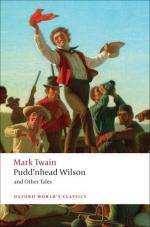We now went into the house, and they began to ask us a world of questions, whereby it presently came out that we did not know anything concerning who or what we were running from; so the old gentleman made himself very frank, and said we were a curious breed of soldiers, and guessed we could be depended on to end up the war in time, because no Government could stand the expense of the shoe-leather we should cost it trying to follow us around. ‘Marion Rangers! good name, b’gosh!’ said he. And wanted to know why we hadn’t had a picket-guard at the place where the road entered the prairie, and why we hadn’t sent out a scouting party to spy out the enemy and bring us an account of his strength, and so on, before jumping up and stampeding out of a strong position upon a mere vague rumour—and so on, and so forth, till he made us all fell shabbier than the dogs had done, and not half so enthusiastically welcome. So we went to bed shamed and low-spirited; except Stevens. Soon Stevens began to devise a garment for Bowers which could be made to automatically display his battle-scars to the grateful, or conceal them from the envious, according to his occasions; but Bowers was in no humour for this, so there was a fight, and when it was over Stevens had some battle-scars of his own to think about.
Then we got a little sleep. But after all we had gone through, our activities were not over for the night; for about two o’clock in the morning we heard a shout of warning from down the lane, accompanied by a chorus from all the dogs, and in a moment everybody was up and flying around to find out what the alarm was about. The alarmist was a horseman who gave notice that a detachment of Union soldiers was on its way from Hannibal with orders to capture and hang any bands like ours which it could find, and said we had no time to lose. Farmer Mason was in a flurry this time, himself. He hurried us out of the house with all haste, and sent one of his negroes with us to show us where to hide ourselves and our tell-tale guns among the ravines half a mile away. It was raining heavily.
We struck down the lane, then across some rocky pasture-land which offered good advantages for stumbling; consequently we were down in the mud most of the time, and every time a man went down he blackguarded the war, and the people who started it, and everybody connected with it, and gave himself the master dose of all for being so foolish as to go into it. At last we reached the wooded mouth of a ravine, and there we huddled ourselves under the streaming trees, and sent the negro back home. It was a dismal and heart-breaking time. We were like to be drowned with the rain, deafened with the howling wind and the booming thunder, and blinded by the lightning. It was indeed a wild night. The drenching we were getting was misery enough, but a deeper misery still was the reflection that the halter might end us before we were a day older. A death of this shameful sort had not occurred to us as being among the possibilities of war. It took the romance all out of the campaign, and turned our dreams of glory into a repulsive nightmare. As for doubting that so barbarous an order had been given, not one of us did that.




